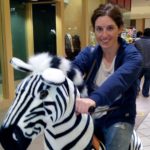Pathogens ranging from coronavirus to influenza virus periodically undergo major evolutionary jumps in their phenotypes, enabling them to infect novel host species and evade host immune responses and interventions. Understanding the genetics of these events and the ecological context in which these events occur is important for mitigating associated adverse health outcomes.
Our research focuses on bluetongue virus (BTV) and epizootic hemorrhagic disease virus (EHDV), which have segmented genomes like influenza and undergo reassortment regularly in transmission systems worldwide. These segmented viruses, transmitted by Culicoides midges in diverse ruminant communities, offer the possibility of understanding how multiple interacting mechanisms facilitate, or limit, opportunities for genetic exchange to occur between distinct virus strains through the process of reassortment.
The ecological context for the emergence of reassortant viral strains emphasizes the ecology of the Culicoides midges that vector these viruses. Life traits of both the viruses and vectors are highly temperature sensitive and the efficiency of transmission could be affected by imminent climate change, variability and crisis. Furthermore, transmission takes place in the context of diverse ruminant communities at the domesticated animal-wildlife interface, with interactions among those animals likely playing a role for diverse strains to meet and spread.
Our experimental system in North America is uniquely valuable for investigating this dynamic in that it offers a platform to intensively study one key midge vector species (Culicoides sonorensis) and multiple wild and domestic ruminant host species across regions with wide ecological gradients. Throughout our work, we integrate laboratory, field, and modeling approaches to address key questions in our research program.
The Mayo Lab is a part of the Center for Vector-Borne Infectious Diseases at Colorado State University.
research project
NAHLN Enhancement: Novel Approach to Diagnose Characterize High Consequence Pathogens
Comprehensive and time sensitive characterization of infectious agents such as avian influenza plays a crucial role in routine diagnostics, disease surveillance, and epidemic response. This work combines next generation sequencing with a bead based Luminex MagPix platform in order to generate robust and cost-effective workflow for deeper interrogation of these pathogens.
view project
research project
Vesicular Stomatitis Virus Disease Vectors
This project monitors the insect populations at four dairies and four horse farms within Colorado. Insects are collected with Mosquito Magnet traps, then sent to the Arthropod-Borne Animal Disease Research Unit (ABADRU) for analysis using next generation sequencing to look for: (1) VSV infection and (2) population genetics to identify migration between farms and the river samples.
view project
research project
Cross-scale dynamics of multi-host vector-borne pathogens at the wildlife-domestic interface in ruminant communities
This research examines the role of host density, host diversity, and viral reassortment on transmission dynamics of vector-borne diseases using bluetongue virus (BTV) and epizootic hemorrhagic disease virus (EHDV), transmitted by Culicoides midges, as our model system.
view project
research project
The Impact of Viral Recombination on the Epidemiology of Viruses
This project aims to create an extensive library of viral segment genomes by using next generation sequencing to characterize hundreds of bluetongue viral isolates from a collection maintained at FABADRU. This genomic information will be used to create a viral evolution forecasting tool to support both prediction of outbreak events and management of insect vector populations.
view project
Publications
Role of succinyl substituents in the mannose-capping of lipoarabinomannan and control of inflammation in Mycobacterium tuberculosis infection.
Palčeková Z, Obregón-Henao A, De K, Walz A, Lam H, Philp J, Angala SK, Patterson J, Pearce C, Zuberogoitia S, Avanzi C, Nigou J, McNeil M, Muñoz Gutiérrez JF, Gilleron M, Wheat WH, Gonzalez-Juarrero M, Jackson M. PLoS Pathog. 2023 Sep 5;19(9):e1011636. doi: 10.1371/journal.ppat.1011636. eCollection 2023 Sep. PMID: 37669276
SARS-CoV-2 surveillance in a veterinary health system provides insight into transmission risks.
Sparrer MN, Hodges NF, Ragan I, Yamashita T, Reed KJ, Sherman TJ, Mayer T, Maichak C, Adney DR, Carpenter M, Webb TL, Mayo C. J Am Vet Med Assoc. 2023 Oct 13;262(1):93-99. doi: 10.2460/javma.23.05.0229. Print 2024 Jan 1. PMID: 38103381
In Situ Hybridization (RNAscope) Detection of Bluetongue Virus Serotypes 10 and 17 in Experimentally Co-Infected Culicoides sonorensis.
Carpenter M, Benavides Obon A, Kopanke J, Lee J, Reed K, Sherman T, Rodgers C, Stenglein M, McDermott E, Mayo C. Pathogens. 2023 Sep 30;12(10):1207. doi: 10.3390/pathogens12101207. PMID: 37887723
Culicoides-borne Orbivirus epidemiology in a changing climate.
Hudson AR, McGregor BL, Shults P, England M, Silbernagel C, Mayo C, Carpenter M, Sherman TJ, Cohnstaedt LW. J Med Entomol. 2023 Nov 14;60(6):1221-1229. doi: 10.1093/jme/tjad098. PMID: 37862060
Monitoring longitudinal immunological responses to bluetongue virus 17 in experimentally infected sheep.
Westrich JA, McNulty EE, Carpenter M, Burton M, Reed K, Nalls A, Sandoval A, Mayo C, Mathiason CK. Virus Res. 2023 Dec;338:199246. doi: 10.1016/j.virusres.2023.199246. Epub 2023 Oct 19. PMID: 37858729
more publications
contact information
Office: Center for Vector-Borne Infectious Diseases Room 154
(970) 297-1287
[email protected]










